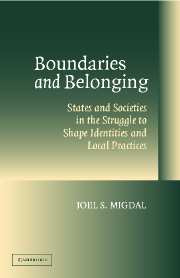 Boundaries and Belonging
Boundaries and Belonging Book contents
- Frontmatter
- Contents
- List of Contributors
- Preface and Acknowledgments
- PART I INTRODUCTION
- PART II ON THE EVE OF THE NATION-STATE: THE OTTOMAN EMPIRE
- PART III THE STATE AND “DANGEROUS POPULATIONS”
- PART IV INSCRIBING MEMBERSHIP AND CONTESTING MEMBERSHIP IN THE NATION
- PART V BEYOND THE STATE: TRANSNATIONAL FORCES AND THE CHALLENGE TO THE STATE
- PART VI CONCLUSION
- 14 Conclusion
- Index
14 - Conclusion
Published online by Cambridge University Press: 25 July 2009
- Frontmatter
- Contents
- List of Contributors
- Preface and Acknowledgments
- PART I INTRODUCTION
- PART II ON THE EVE OF THE NATION-STATE: THE OTTOMAN EMPIRE
- PART III THE STATE AND “DANGEROUS POPULATIONS”
- PART IV INSCRIBING MEMBERSHIP AND CONTESTING MEMBERSHIP IN THE NATION
- PART V BEYOND THE STATE: TRANSNATIONAL FORCES AND THE CHALLENGE TO THE STATE
- PART VI CONCLUSION
- 14 Conclusion
- Index
Summary
Over the past decade, forms of state power and the relations between the state and society have been apprehended in terms of both their complexity and their potential fluidity. The most recent studies establish a point of convergence, highlighting transformations in frontiers of power; the complexity of the state and the ambivalent nature of its specific manifestations; and the porosity and mobility of national, social, and political boundaries and social formations, whatever their origins. Likewise, these works underscore the plurality of identities and the fact that seemingly contradictory affiliations are not necessarily mutually exclusive. While the state-society opposition still structures prevailing modes of analysis in centers of power, and most notably in the heart of world financial institutions and the “international community,” it is nonetheless recognized among scholars as being reductionist and hence of little utility in efforts to outline actual modalities of power. To reiterate Joel Migdal, “The state's being simultaneously a part of society and apart from society” (Introduction) is now a generally accepted axiom.
The introduction to this book and the chapters that follow all confirm this thought: The plurality of affiliations are not systematically opposed, since they intersect and articulate with one another, and the fluidity of socio-political frontiers makes questions about the centrality or marginality of the state futile, if not sterile. The chapters herein avoid this impasse, inquiring instead into the ways in which we can conceptualize and understand the multiple nature of the logics of power.
- Type
- Chapter
- Information
- Boundaries and BelongingStates and Societies in the Struggle to Shape Identities and Local Practices, pp. 339 - 358Publisher: Cambridge University PressPrint publication year: 2004


